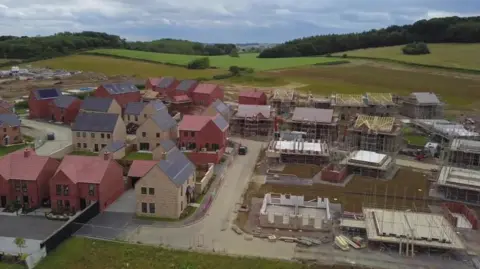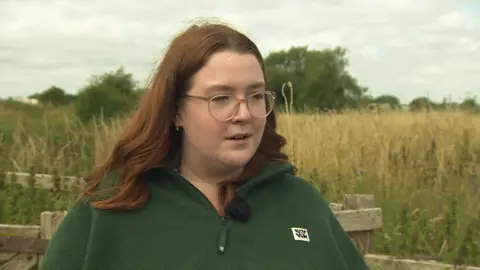Environmental building rules 'a challenge'
 BBC
BBCEnforcing environmental laws forcing developers to improve wildlife habitats will be a "challenge", ecologists have warned.
Biodiversity Net Gain (BNG) means sites have to be assessed and developers must commit to delivering an improvement in biodiversity that lasts over a 30-year period.
Oxford University researcher Natalie Duffus said the system was "offsetting" damage to the environment.
Natural England said the measures would "leave nature in a better place" than before the development.
Ms Duffus has been measuring how accurately land has been scored under BNG assessments.
"There is a real trade-off between something that is simple and usable everywhere across the country, and with the ecological complexity and capturing all the different parts of a habitat.
"With BNG you are potentially damaging a habitat today and offsetting it with the promise of a future habitat. Making sure that happens is a bit of a challenge."
Iain Delaney, of Captiva Homes which is currently building homes on the Isle of Wight, said there was "cost and complexity" for house builders involved in achieving BNG.
"But against the overall objective of enhancing the area post delivering development - I think its a meaningful step forward."

BNG became a mandatory part of the planning system in England in February as part of the 2021 Environment Act.
Before bulldozers move on to a development site, a BNG assessment must now be made of the habitat's size, type and condition to create a numerical biodiversity metric.
Habitats and wildlife are given a numerical value using a government-developed metric calculator.
Native hedgerows and hay meadows, which support dozens of species and merit a high unit value, down to less habitat-rich cropland, and derelict land, which are given a low value.
Under the new rules, developers will have to agree to delivering a biodiversity gain of at least 10% of that figure when they are given planning permission.
Improvements have to last at least 30 years.
The introduction of BNG has been brought into sharper focus following the new Labour government's stated aim of building 1.5m new homes in England.
The improvement to habitat can either be within the development area itself or elsewhere, so a market has been created with landowners selling "units" to developers.
Rob Hutchinson, of Surrey Wildlife Trust, said: "The off-site market is one which is growing and developing almost weekly at the moment.
"There are various bodies and charities who are getting involved in providing units.
"The interesting thing will be if there is sufficient capacity of units around the south east and around England to be able to facilitate the amount of development which may be coming forward in the future."
Dr Nicholas White, principal advisor for net gain at Natural England, insisted BNG was "not a tick box exercise".
"What BNG provides is an objective and standardised way of assessing the value of nature, and then ensuring where development proceeds, is done on a basis that is sustainable and is giving a good outcome for the natural environment, as well as providing the homes and the businesses we need."
He said the calculator system provided a "quantifiable measure" to define the quality of habitats.
He said the system was already seeing "positive changes".
"The environment used to be an afterthought... that's disappearing, people are realising they need to work together and think about it from the outset."
Follow BBC South on Facebook, Twitter, or Instagram. Send your story ideas to [email protected].
